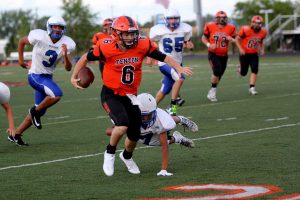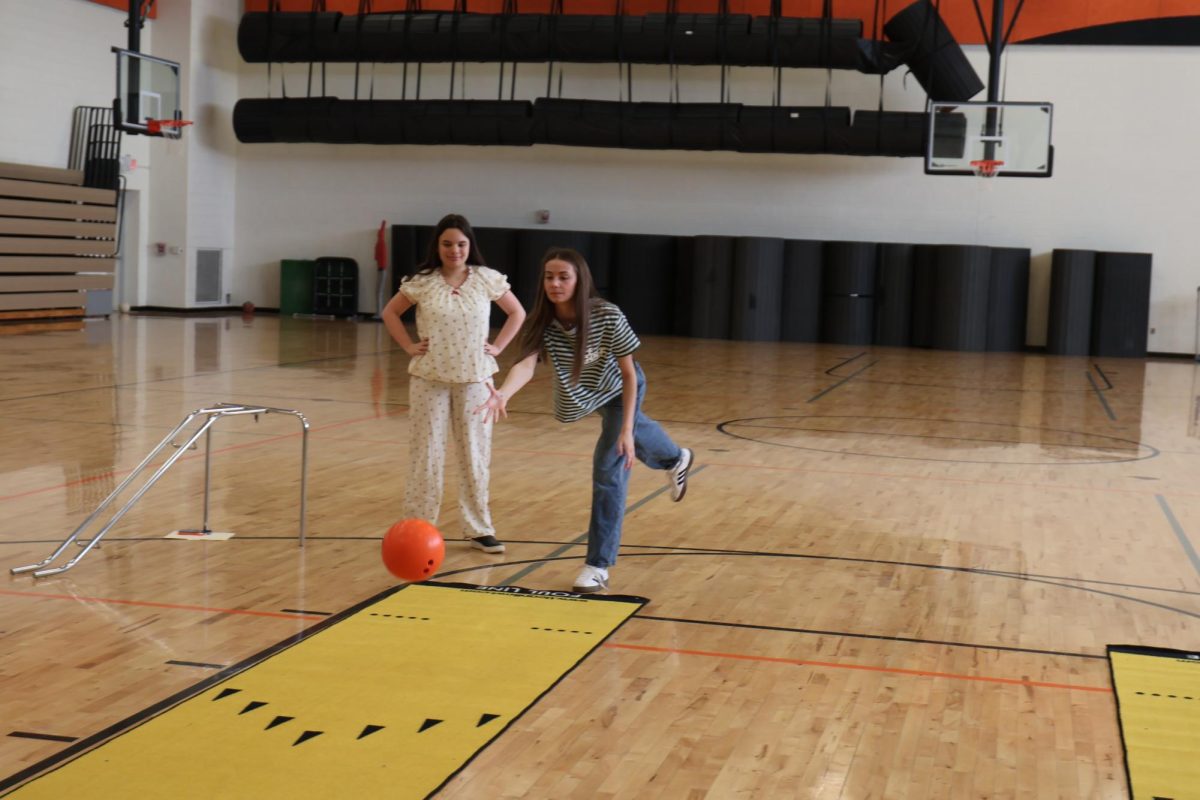In light of recent events surrounding the NFL, students encouraged to stand for the pledge
November 14, 2017
Kneeling, standing or linking arms with their teammates, professional athletes are making the news, and if one is a sports fan they probably have seen this on their television screen. Political figures have also taken a stand for what they believe is right or wrong when it comes to acknowledging the National Anthem.
“If a player wants the privilege of making millions of dollars in the NFL (National Football League), or other leagues,” President Donald Trump tweeted. “He or she should not be allowed to disrespect our great american[sic] flag (or country) and should stand for the National Anthem. If not, you’re fired. Find something else to do.”
Trump has spoken out on his views of National Football League (NFL) players not standing and taking a knee for the National Anthem. As a result of the players taking a knee, the President is looking for a way to prove his point by using tax consequences as means to threaten them.
“He has put the First Amendment in play by threatening the NFL,” Legal Director David Loy and Staff Attorney of American Civil Liberties Union (ACLU) Melanie Ochoa said. “He’s threatened the teams with tax consequences if they don’t discipline players who exercise their First Amendment right to protest police brutality and other racial injustices. Public officials have the right to express themselves and use their celebrity to state their views. However, the First Amendment prohibits them from threatening ‘to employ coercive state power’ against private entities ‘to stifle protected speech’ of individuals exercising their constitutional rights.”
Threatening athletes because they won’t stand is going against the First Amendment. The Fenton athletics program has issued a statement in regards to the kneeling for the pledge verus standing.
“Although Fenton Area Public Schools has not experienced any demonstrations or protests centered around the National Anthem, some schools in our county have,” Athletic Director Michael Bakker said. “I want to make clear that regardless of our personal beliefs on this subject we are to uphold the laws of the constitution which allow for the freedom of speech and the right to peacefully protest. So long as individuals are not interfering with an event, school day, etc, we will allow them to show their beliefs during the National Anthem in the form or standing, sitting, or kneeling. There have been stories of high school students and their parents being removed or suspended from sporting events for choosing to kneel during the anthem. This will not be the case at Fenton.”
The protection of free speech extends to the Pledge of Allegiance. Students are not required to stand for the Pledge of Allegiance according to the ruling of West Virginia State Board of Education v. Barnette. It states that “The Free Speech Clause of the First Amendment to the United States Constitution protected students from being forced to salute the American flag and say the Pledge of Allegiance in public school.”
Standing up, with a hand over the heart and saying, “I pledge allegiance to the flag. . .” is something that students have done since kindergarten, although students are not required to stand, the administration hopes that students stand out of respect for others. Whether they stand and recite the pledge, stand and don’t talk or sit and stay quiet, legally it is up to students to decide what they feel like doing.
“At the meeting at the beginning of the school year I was very careful with my words,” Principal Mark Suchowski said. “I said ‘It’s my expectation for you to stand for the pledge out of respect for those who have served for our country or that are currently now.’ I wanted people to understand my expectation for them to respect the service of others; even if they don’t believe in standing for the pledge out of respect for the other students that want to, I hope that they stand.”
The new expectation for students was a high school decision; it is different for every building when talking about the pledge. By law, schools are required to recite the pledge for those students who want to stand and say it.
“A good reason to not stand would be for religious reason,” Suchowski said. “However, I never heard of a religion that says that they can’t stand for the pledge. I said that if they are doing it [not standing] to spite me, their teacher or classmates, it’s not a good reason to not stand. We have said that we want students to stand in years past, but this year I wanted to start on a good foot. I was a little more constant with telling students to stand if they can. Instead of doing one-on-one talks with people who didn’t want to stand, I made the big announcement at the meetings. We say the pledge every day because the law requires schools to do it.”
The reason why schools are required to recite the pledge every day is because of the passing of the legislation that Michigan Governor Rick Snyder signed requiring public school students be provided the opportunity to recite the Pledge of Allegiance each school day.
Students and athletes alike have the right to choose whether they stand, kneel, or sit as the First Amendment protects their right to chose.










